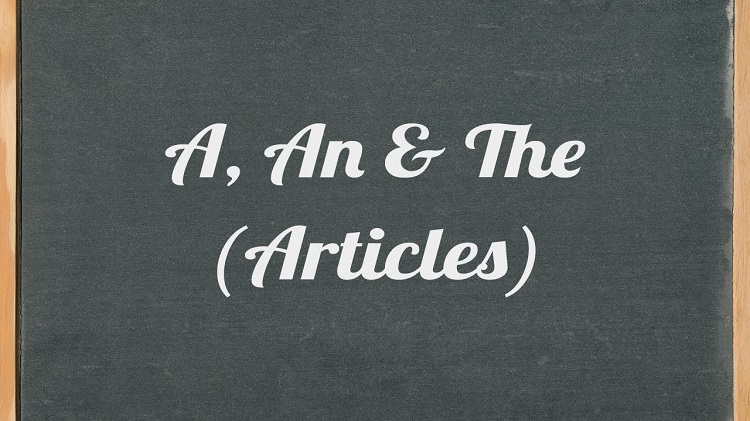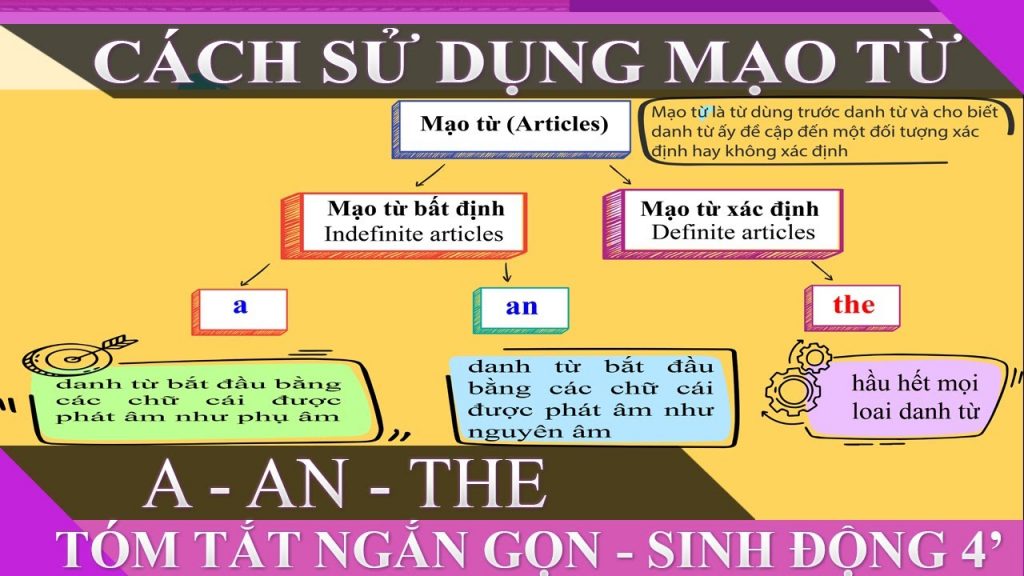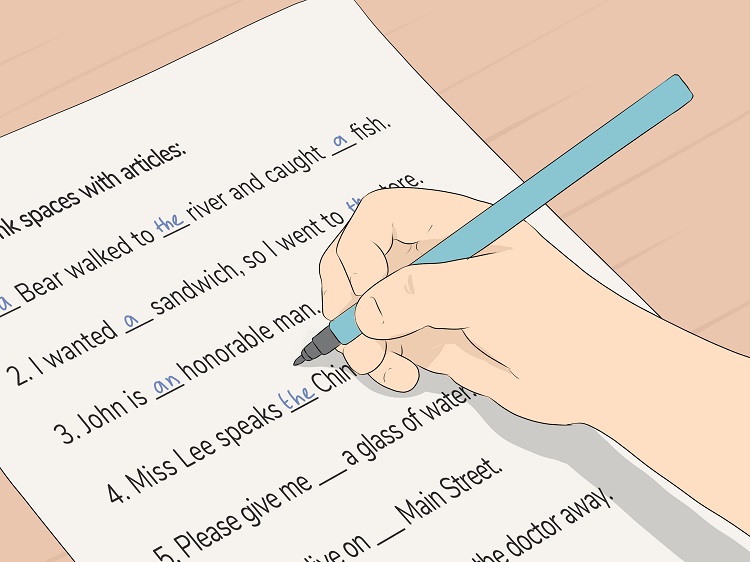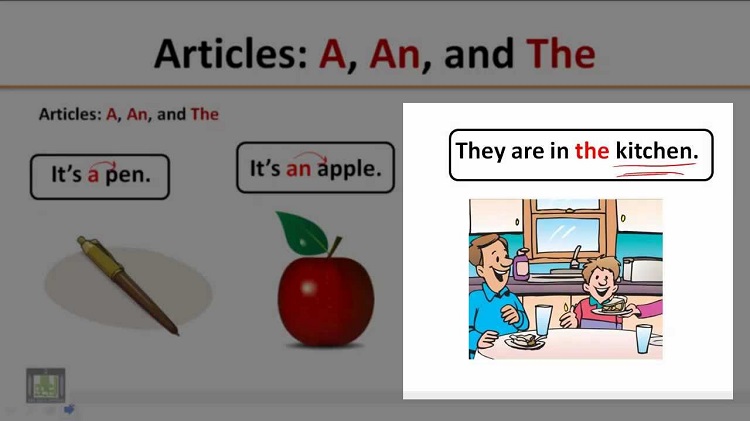Bên cạnh nắm chắc kiến thức về danh từ, chủ đề ngày hôm nay, duhoctms.edu.vn sẽ thảo luận đó là Mạo từ (Article). Đây là chủ điểm ngữ pháp quan trọng. Việc nắm được kiến thức bên dưới sẽ giúp ích bạn rất nhiều trong bài thi IELTS đặc biệt là IELTS writing.
Nội dung chính:
1. Mạo từ (Article) là gì?
Mạo từ là từ đứng trước danh từ nhằm cho biết danh từ đó nói đến một đối tượng xác định hay không xác định.
- Mạo từ “The” dùng để chỉ đối tượng xác định .
- Mạo từ “A/An” được dùng nói đến một đối tượng chưa xác định được.
Mạo từ không phải một loại từ riêng biệt, chúng có thể được xem là một bộ phận của tính từ dùng bổ nghĩa cho danh từ .
2. Phân loại Mạo từ (Article) trong tiếng Anh
Mạo từ trong tiếng Anh gồm 2 loại bao gồm:
- Mạo từ xác định (Definite article): the
- Mạo từ bất định (Indefinite article): a, an

2.1. Mạo từ xác định
Dùng mạo từ xác định “the” trong các trường hợp sau:
- Sự vật, sự việc kể đến hai lần
Ví dụ:
I live in a house. The house is very big.
He has two children: a daughter and a son. The daughter is a pupil. The son is very small.
- Chỉ các yếu tố duy nhất: The sun, the earth, the moon, the sea…
- Đứng sau tính từ
The poor: những người nghèo
The young: những người trẻ tuổi
The old: những người già
The rich: những người giàu có
- Trước từ chỉ tên riêng
Ví dụ: the Nile, the Bach Dang hotel, the Mekong river, the Himalaya, the Buc Tuong….
- Chỉ quốc tịch: The Chinese , the Vietnamese, ……..
- Trước tên của tổ chức, nhiều bang: The United Nations, the United States the Asian.
2.2. Mạo từ A/An được dùng trong những trường hợp sau:
- Trước sự vật, sự việc được kể đến lần đầu tiên
Ví dụ:
I live in a house near a bank.
He has two children: a son and a daughter.
- Chỉ nghề nghiệp
I’m a teacher
My brother is an programmer.
- Các cụm từ/ từ chỉ lượng: a pair of/ a thousand/ a little/ a few…
- Dùng trong câu cảm thán: what a + noun
What a beautiful girl!
What big rain!
- Có nghĩa là “một”: There is a pen on the table.
Lưu ý: dùng “An” trước những danh từ bắt đầu bằng các nguyên âm: e,u,o,ai.
3. Cách dùng Mạo từ (Article) trong tiếng Anh
3.1. Mạo từ “The” (mạo từ xác định)
Mạo từ “The” được đặt dùng khi người nói đề cập đến đối tượng/ sự vật cụ thể, xác định được. Bạn hãy xem những trường hợp bên dưới:

- Sự vật/ hiện tượng được nhắc lại 2 lần
Ví dụ: I saw a dog. The dog run away (Tôi thấy con chó. Con chó chạy đi)
- Chỉ các yếu tố duy nhất mà người đọc và nghe đều biết đến (mặt trăng, mặt trời, trái đất,..)
Ví dụ: The sun is huge (Mặt trời là khổng lồ) – Mặt trời là một vật thể độc nhất, ai cũng biết
- “The” + tính từ chỉ một đặc điểm nổi bật của sự vật hiện tượng nào đó
Ví dụ: The poor.. (những người nghèo), The rich.. (những người giàu có)
- “The” đặt trước tên riêng (biển, sông, quần đảo, quần thể, tên số nhiều của quốc gia, sa mạc,..)
Ví dụ: The Him Lam company, the Himalaya Corp, the Asian, the United States,..
- “The” đặt trước từ chỉ quốc tịch
Ví dụ: The Vietnamese, The Chinese, The Korean
- “The” + họ/ tên (ở số nhiều) nghĩa là gia đình + tên
Ví dụ: The Hanh = Gia đình Hạnh (bao gồm các thành viên trong gia đình Hạnh)
3.2. Mạo từ “a”, “an” – Mạo từ không xác định
Mạo từ “a”, “an” được dùng để đề cập đến sự vật/ hiện tượng không cụ thể. “a” được sử dụng trước phụ âm, “an” được sử dụng trước nguyên âm (a, e, i, o, u) hoặc phụ âm có âm câm (an hour).
- “a”, “an” đứng trước sự vật/ hiện tượng được đề cập lần đầu
Ví dụ: I live in a house, near a park (Tôi sống trong căn nhà kế bên là công viên)
- Một người/ sự vật trong nhóm lớn
Ví dụ:
He is a student at Greenwich (Anh ấy là sinh viên tại Greenwich)
She is a part of my group (Cô ấy là một phần của nhóm tôi)
- Dùng để nói về nghề nghiệp
Ví dụ:
He is an engineer (Anh ấy là một kỹ sư)
She is a doctor (Cô ấy là một bác sĩ)
- Dùng cho một danh từ số ít, đại diện cho 1 nhóm người/ 1 loại
Ví dụ:
a dog likes an animal (Chó là một con vật) – Tất cả chó đều là con vật
a Woman needs friends (Phụ nữ cần bạn bè) – Tất cả phụ nữ đều cần bạn bè
3.3. Lưu ý khi sử dụng Mạo từ (Article)
Không dùng “The” trong các trường hợp sau:
- Trước tên quốc gia, châu lục, núi, hồ, tên đường
- Khi danh từ không đếm được hoặc danh từ số nhiều không mang đặc điểm đặc biệt
- Sau sở hữu tính từ (Possessive adjective) và danh tử sở hữu cách (possessive case)
- Tên gọi bữa ăn
- Trước các tước hiệu (President,..)
Không dùng “a”, “an” trong các trường hợp sau
- Trước danh từ số nhiều
- Trước danh từ không đếm được
- Trước tên gọi các bữa ăn (trừ khi có tính từ đứng trước nó)
4. Những trường hợp không dùng mạo từ (Article)

| Trước tên quốc gia, châu lục, tên núi, hồ, đường phố (Ngoại trừ những nước theo chế độ Liên bang – gồm nhiều bang (state) | Europe: Châu Âu, France, Wall Street, Sword Lake |
| Khi danh từ không đếm được hoặc danh từ số nhiều dùng theo nghĩa chung chung, không chỉ riêng trường hợp nào | I like dogs. Oranges are good for health. |
| Trước danh từ trừu tượng, trừ khi danh từ đó chỉ một trường hợp cá biệt | Men fear death. The death of his father made him completely hopeless. |
| Ta không dùng “the” sau tính từ sở hữu hoặc sau danh từ ở dạng sở hữu cách | My friend, không phải “my the friend” The man’s wife không phải “the wife of the man” |
| Không dùng “the” trước tên gọi các bữa ăn hay tước hiệu | They invited some close friends to dinner. (Họ đã mời vài người bạn thân đến ăn tối.) Nhưng: The wedding dinner was amazing (Bữa tiệc cưới thật tuyệt vời.) Ta nói: President Obama (Tổng thống Obama, Chancellor Angela Merkel (Thủ tướng Angela Merkel..) |
| Không dùng “the” trong các trường hợp nhắc đến danh từ với nghĩa chung chung khác như chơi thể thao, các mùa trong năm hay phương tiện đi lại | Come by car/ by bus (Đến bằng xe ô tô, bằng xe buýt)In spring/ in Autumn (trong mùa xuân,mùa thu), from beginning to end (từ đầu tới cuối), from left to right (từ trái qua phải) To play golf/chess/cards (chơi golf, đánh cờ, đánh bài) Go to bed/hospital/church/work/prison (đi ngủ/ đi nằm viện/ đi nhà thờ/ đi làm/ đi tù) |
5. Bài tập mẫu về mạo từ (Article)
Phần bài tập
Bài 1: Chọn mạo từ đúng trong mỗi câu bên dưới
- Did you bring ________________ (a, an, the) umbrella?
- Are you looking for________________ (a, an, the) shampoo?
- I checked ________________ (a, an, the) mailbox again.
- Can I have ________________ (a, an, the) spoon please?
- I was born into ________________ (a, an, the) poor family.
- She will come back in ________________ (a, an, the) hour.
- Have you been to ________________ (a, an, the) Space Needle Tower in Seattle?
- I would love to talk to one of ________________ (a, an, the) managers.
- What ________________ (a, an, the) amazing view!
- The helicopter landed on ________________ (a, an, the) roof of a building.
Bài 2: Please complete the following exercise using a/an/the/0 (no article) in the underlined spaces where appropriate. Change capital letters to lower case letters at the beginning of a sentence if necessary

Ms Parrot, (1) most famous lady detective of (2) twenty-first century, was born in (3) United Kingdom in (4) 1960s. Since then, she has been to many countries, including (5) Portugal, Singapore and Australia, and has lived in (6) northern hemisphere and (7) southern hemisphere, as well as on (8) equator.
She has never been to (9) Philippines or (10) United States, but she speaks (11) English, French and Portuguese. Like Sherlock Holmes,(12) famous detective, she plays (13) violin, and sometimes practises up to five times (14) day. She is also (15) only person in (16) world to have performed Tchaikovsky’s 1812 overture [a long piece of music] in one breath on (17) recorder.
She has been (18) detective for thirty years and claims that although many people think that being (19) detective is (20) piece of cake, detectives generally work very hard and it’s not all fun and games. (21) detective is someone who solves mysteries, and (22) people who contact Ms Parrot have some very unusual problems.
Little information is available about some of (23) cases she has solved, but quite (24) few of her most famous cases have attracted worldwide attention and she has been offered up to (25) thousand dollars (26) hour to help solve mysteries such as (27) case of (28) Australian owl in (29) uniform. (30) bird laid (31) egg in (32) European nest in less than (33) hour after its arrival. What (34) strange problem!
With great (35) modesty, she has either declined such (36) fee or donated (37) money to (38) poor, or to (39) Grammar Survival Fund, believing that (40) detective should use their skills for (41) common good.
Bài tập 3: Điền a/an hoặc the
1. This morning I bought….newspaper and …….magazine. …….newspaper is in my bag but I don’t know where I put…..magazine.
2. I saw ……accident this morning. ……car crashed into …..tree. ………driver of ……car wasn’t hurt but …..car was badly damaged.
3. There are two cars parked outside:……..blue one and …….grey one. ……..blue one belongs to my neighbors. I don’t know who ….. owner of…..grey one is.
4. My friends live in…….old house in……small village. There is …….beautiful garden behind ……..house. I would like to have……garden like this.
5. This house is very nice. Has it got …….garden?
6. It’s a beautiful day. Let’s sit in……..garden.
7. Can you recommend ……..good restaurant?
8. We had dinner in…….most expensive restaurant in town.
9. There isn’t ……….airport near where I live. …….nearest airport is 70 miles away.
10. “Are you going away next week?”
– “No, …..week after next”
Bài tập 4: Hoàn thành các câu dưới đây sử dụng một giới từ phù hợp
| Bed, home, hospital, prison, school, university, work |
1. Two people were injured in the accident and were taken to hospital.
2. In Britain, children from the age of five have to go………………
3. Mark didn’t go out last night. He stayed……………………..
4. I’ll have to hurry. I don’t want to be late……………..
5. There is a lot of traffic in the morning when everybody is going………………
6. Cathy’s mother has just had an operation. She is still……………
7. When Julia leaves school, she wants to study economics…………….
8. Bill never gets up before 9 o’clock. It’s 8.30 now, so he is still……………..
9. If you commit a serious crime, you could be sent……………….
Bài tập 5: Chọn đáp án đúng
1. I’m afraid of dogs/the dogs.
2. Can you pass the salt/salt, please?
3. Apples/the apples are good for you.
4. Look at apples/the apples on that tree! They are very big.
5. Women/the women live longer than men/the men.
6. I don’t drink tea/the tea. I don’t like it.
7. We had a very nice meal. Vegetables/ the vegetables were especially good.
8. Life/the life is strange sometimes. Some very strange things happen.
9. I like skiing/the skiing. But I’m not good at it.
10. Who are people/the people in this photograph?
11. What makes people/the people violent? What causes aggression/the aggression?
12. All books/all the books on the top shelf belong to me.
13. First world war/ the first world war lasted from 1914 until 1918.
14. One of our biggest problems is unemployment/the unemployment.
Bài tập 6: Điền vào chỗ trống mạo từ thích hợp hoặc để trống
1) I bought……….pair of sneakers.
2) I saw…………film last night.
3) Look at…………..men over there! He is a famous actor.
4) I don’t like………..volleyball.
5) That is……..student I told you about.
6) Mike traveled to………..Germany.
7) I heard………amazing story from Lisa yesterday.
8) I live in………apartment. …………apartment is quite small.
9) Rosa can play………guitar.
10) Yamora is…………..Japanese.
Bài tập 7: Chọn đáp án đúng
1) This is………milk.
A. a B. an C. the D. –
2) We have to wear……..uniform to school.
A. a B. an C. the D. –
3) ……..sun is hot.
A. a B. an C. the D. –
4) He is………honest man.
A. a B. an C. the D. –
5) ……..Ha Noi is the capital of Viet Nam.
A. a B. an C. the D. –
6) ………cat is white.
A. a B. an C. the D. –
7) This is………ugly dog.
A. a B. an C. the D. –
8) …….dogs have four legs.
A. a B. an C. the D. –
9) May I have……….glass of milk?
A. a B. an C. the D. –
10)..…book has pages.
A. a B. an C. the D. –
Đáp án bài tập mạo từ (Article)

Bài 1
| 1) an | 2) the | 3) the | 4) a | 5) a |
| 6) an | 7) the | 8) the | 9) an | 10) the |
Bài 2
- the detective – Singular countable noun; superlative (most)
- the century – Singular countable noun; ordinal (twenty-first)
- the United Kingdom – a country with ‘United’ in the name
- the 1960s – a decade
- 0 Portugal – Country names don’t usually take an article, unless they are plural or have ‘United’ in the name
- the northern hemisphere – Singular countable noun; a unique place – there is only one northern hemisphere
- the southern hemisphere – Singular countable noun; a unique place – there is only one southern hemisphere
- the equator – a unique place – there is only one equator
- the Philippines – a country with a plural name
- the United States – a country with a plural name
- 0 English – a language
- the detective – Singular countable noun; everyone knows about this detective, so he is not just ‘a famous detective’ (one of many) but ‘the famous detective’ whose name everyone knows
- the violin – Singular countable noun; playing an instrument
- a day – Singular countable noun; a rate
- the only person – Singular countable noun preceded by a unique adjective (only)
- the world – Singular countable noun; a unique place
- the recorder – Singular countable noun; this is similar to ‘she plays the recorder’. It refers to a kind of instrument, not a particular example of that
- a detective – Singular countable noun; a job
- a detective – Singular countable noun; a job
- a piece – Singular countable noun; a single part of a (A piece of cake is also an idiom meaning ‘very simple’.)
- a detective – Singular countable noun; Definitions can take ‘a’ or ‘the’. In this case, it means that any detective is a person who solves mysteries.
- the people – Plural countable noun followed by a relative clause (who contact Ms Parrot)
- the cases – Plural countable noun followed by a relative clause (abbreviated from which she has solved)
- a few – Pronoun (a few); positive, meaning ‘some’
- a thousand – A number; a is used instead of one
- an hour – Singular countable noun starting with a vowel sound; a
- the case – Singular countable noun; specific (we know which case) and followed by of
- an owl – Singular countable noun; first Australian starts with a vowel sound, so it takes an. In many detective novels, you will see titles such as The case of the city clerk (by Agatha Christie). This is a convention in detective novel titles, and draws the reader into the plot, as though they are already familiar with the case.
- a uniform – Singular, countable noun starting with a consonant sound; first mention
- the bird – Singular, countable noun; we know which bird – the owl that was mentioned previously
- an egg – Singular, countable noun starting with a vowel sound; first mention
- a European nest – Singular, countable noun preceded by an adjective starting with a consonant sound; first mention
- an hour – Singular, countable noun starting with a vowel sound; first mention
- a problem – Singular, countable noun; first This is also an exclamation, and exclamations often take a
- 0 modesty – Uncountable noun
- a fee – Singular, countable noun; expression such a takes a
- the money – Uncountable noun; money is associated with fee, so we know which money and it becomes definite
- the poor – Uncountable noun; an adjective used as a noun
- the Grammar Survival Fund – Singular, countable noun; names of organisations usually take the
- the detective – Singular, countable noun; a representative of a class
- the good – Uncountable noun; an adjective used as a noun
Bài 3
1. This morning I bought…a….newspaper and ..a…magazine. ..The…newspaper is in my bag but I don’t know where I put…the ..magazine.
2. I saw …an…accident this morning. …a…car crashed into …a..tree. …The……driver of …a…car wasn’t hurt but …the..car was badly damaged.
3. there are two cars parked outside:…a…..blue one and …a….grey one. …the…..blue one belongs to my neighbors. I don’t know who …the.. owner of…the..grey one is.
4. My friends live in…an….old house in…a…small village. There is …a….beautiful garden behind …the…..house. I would like to have…a…garden like this.
5. This house is very nice. Has it got …a….garden?
6. It’s a beautiful day. Let’s sit in…the…..garden.
7. Can you recommend …a…..good restaurant?
8. We had dinner in…the….most expensive restaurant in town.
9. There isn’t …an…….airport near where I live. …the….nearest airport is 70 miles away.
10. “Are you going away next week?” – “No, .. the…..week after next”
Bài 4
1. Two people were injured in the accident and were taken to hospital.
2. In Britain, children from the age of five have to go to school.
3. Mark didn’t go out last night. He stayed at home.
4. I’ll have to hurry. I don’t want to be late for school.
5. There is a lot of traffic in the morning when everybody is going to work.
6. Cathy’s mother has just had an operation. She is still in hospital.
7. When Julia leaves school, she wants to study economics at university.
8. Bill never gets up before 9 o’clock. It’s 8.30 now, so he is still in bed
9. If you commit a serious crime, you could be sent to prison.
Bài 5
| 1. dogs | 2. the salt | 3. apples | 4. the apples | 5. women, men |
| 6. tea | 7. the vegetables | 8. life | 9. skiing | 10. the people |
| 11. people, aggression | 12. All the books | 13. The first world war | 14. unemployment. |
Bài 6
| 1) a | 2) a | 3) the | 4) X | 5) the |
| 6) X | 7) an | 8) an / The | 9) the | 10) X |
Bài 7
| 1) D | 2) A | 3) C | 4) B | 5) D |
| 6) C | 7) B | 8) D | 9) A | 10) A |
Qua những trình bài chi tiết về Mạo từ (Article) trong tiếng Anh của duhoctms.edu.vn ở trên, các bạn có thể thấy cách dùng mạo thật đơn giản phải không? Mong rằng qua bài viết này, bạn sẽ không sử dụng sai Mạo từ nữa và làm tốt các bài tập ngữ pháp của mình nhé!


Bình luận